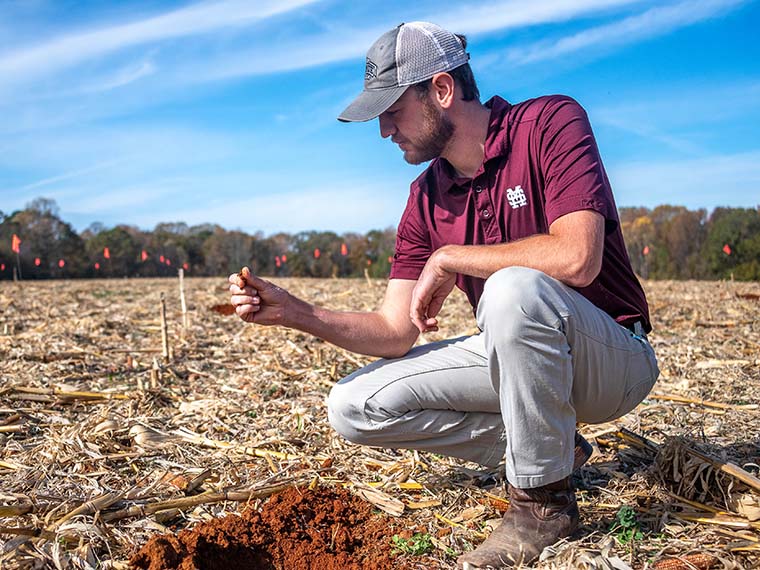The information presented on this page may be dated. It may refer to situations which have changed or people who are no longer affiliated with the university. It is archived as part of Mississippi State University's history.
Nolan Mullican, a Stanley, Kentucky native, has begun a remarkable academic journey as a graduate student at Mississippi State University. With a passion for agricultural research, he is making significant contributions to the field.
Mullican's early experiences instilled a deep connection to agriculture. His family's farm primarily cultivated tobacco, soybean, and corn, providing him with a hands-on understanding of the challenges and intricacies of farming.
"Helping on the family farm and then working on a neighboring farm builds a lot of character. It makes you appreciate little wins more than anything." Mullican reminisced.
His journey to Mississippi State began when he presented at a conference in Birmingham, Alabama, as an undergraduate pursuing a major in agronomy and crop science at Murray State University. There, he crossed paths with Dr. Jason Krutz, professor in the Department of Plant and Soil Sciences and director of the Mississippi Water Resources Research Institute. Krutz recognized Mullican's potential and introduced him to Dr. Erick Larson, extension and research professor, who offered him an opportunity to pursue a graduate degree at MSU.
Mullican is completing his master's degree.
He is studying the integration of cover crops with primary crops, such as corn. Cover crops produce vegetation which can help protect the soil from erosion, improve soil organic matter, and provide other conservation benefits during the winter when traditional summer crops are not grown. Current agricultural policy offers subsidies for growing cover crops. He hopes to help Midsouth farmers integrate these beneficial crops in a manner that maximizes environmental benefits without compromising crop performance and yield.
Working under the direction of Larson, Mullican's research is assessing how cover crops can be integrated into corn production systems without introducing risks or hindering profitability.
"Cover crops are a hot topic, but grower adoption is very low because cover crops don't produce monetary returns and commonly present problems which hinder the subsequent primary crop. These systems are particularly challenging because the cover crop growing season extends well past the optimal time for planting corn. Thus, cover crops can present issues by delaying corn planting progress, hampering efficiency, and competing with corn, or any other primary crop," Mullican explained.
His ultimate goal is to identify limitations and management practices needed to successfully integrate cover crops into Midsouth corn production systems without sacrificing economic returns or increasing production risks.
His studies address cover crop termination timing, and planting methods intended to alleviate cover crop issues associated with corn seeding and establishment. He is also investigating various cover crop species and mixtures. His research has discovered that termination of cover crops is key to a successful corn stand.
"We have found that cover crop termination timing has a dramatic impact on corn productivity. Cover crop vegetation not only hindered planter efficiency and stand establishment, but also stunted corn growth and reduced grain yield if it was not terminated prior to planting. In fact, corn suffered unless cover crops were terminated at least four weeks in advance of planting," Mullican said.
Cover crop vegetation reduces absorption of solar radiation and limits soil temperature, which stunts corn growth and development, Mullican added.
Scientists advise farmers to terminate cover crops with herbicides at least four weeks before planting to maintain productivity of early corn planting systems, which are tailored for high rainfall, southern climates.
Mullican's background in agronomy, combined with hands-on experience on his family's farm, has equipped him with the knowledge and passion needed to tackle the unique challenges of this field. With a strong focus on integrating cover crops and an eye toward practical solutions, Mullican's research contributes to the ever-evolving landscape of sustainable agriculture.
"Having grown up in a farm family, my main goal is to conduct applicable research that will help my dad and my friends at home who are still farming. My hope is my research gives them answers that are science-based that they could apply to their farms," Mullican said.
This research is funded by the Mississippi Corn Promotion Board.

